Cremation, Caste, and Cosmogony in Karmic Traditions.
Cremation, Caste, and Cosmogony in Karmic Traditions.
Cremation, Caste, and Cosmogony in Karmic Traditions.
You also want an ePaper? Increase the reach of your titles
YUMPU automatically turns print PDFs into web optimized ePapers that Google loves.
The use of the spiritual capacity represents also other<br />
paradoxes. When the ascetic makes use of the magical<br />
qualities he has atta<strong>in</strong>ed through meditation, the<br />
possibilities for acquir<strong>in</strong>g new forces vanish. Thus, “he<br />
who renounces secular life f<strong>in</strong>ally f<strong>in</strong>ds himself rich <strong>in</strong><br />
magical forces, but he who succumbs to the desire to use<br />
them ultimately rema<strong>in</strong>s a mere “magician,” without<br />
power to surpass himself. Only a new renunciation <strong>and</strong> a<br />
victorious struggle aga<strong>in</strong>st the temptation of magic br<strong>in</strong>g<br />
the ascetic a new spiritual temptation” (Eliade 1958:89).<br />
F<strong>in</strong>ally, the power of sadhus or holy men is also a<br />
paradox for the commoners. Particularly, “the bless<strong>in</strong>g<br />
of an Aghori is as beneficent as his curse is awesome”<br />
(Parry 1994:259).<br />
The construction of elitism <strong>and</strong> other statuses<br />
Regard<strong>in</strong>g the creation, ma<strong>in</strong>tenance, <strong>and</strong> loss of elite<br />
status <strong>in</strong> relation to elitist behaviour of holy men, it is<br />
possible to emphasise some structural pr<strong>in</strong>ciples of the<br />
dynamics of social identities <strong>and</strong> statuses. Material<br />
<strong>in</strong>stitutions are not a criterion for elites. Materialisation<br />
of power <strong>and</strong> status may hide the pr<strong>in</strong>ciples of how<br />
statuses are created <strong>and</strong> ma<strong>in</strong>ta<strong>in</strong>ed through social<br />
<strong>in</strong>teraction. Be<strong>in</strong>g accepted as an elite is fundamental<br />
regardless of relations of dom<strong>in</strong>ation <strong>and</strong> the way elites<br />
have acquired their power. Analytically one may<br />
dist<strong>in</strong>guish between authority <strong>and</strong> prestige. Authority<br />
can work <strong>in</strong> two ways. An authoritative person of<br />
superior significance has a character of objectivity<br />
giv<strong>in</strong>g his op<strong>in</strong>ions or faith a confidence <strong>and</strong><br />
overwhelm<strong>in</strong>g weight. In decisions he will have a<br />
prerogative <strong>and</strong> an axiomatic trustworth<strong>in</strong>ess, which<br />
transcend the personality that is always relative <strong>and</strong><br />
subject to criticism. But the authority of super-<strong>in</strong>dividual<br />
powers such as the church, state <strong>and</strong> military may take<br />
the opposite direction. Individuals may deduce their<br />
power <strong>and</strong> authority from these <strong>in</strong>stitutions, which<br />
would never have flowed from their own <strong>in</strong>dividuality.<br />
Prestige, on the other h<strong>and</strong>, lacks the element of supersubjective<br />
significance because the identity of the<br />
personality is not a part of an objective power or norm.<br />
Superiority by prestige has the possibility to “push” the<br />
masses <strong>and</strong> to make unconditional followers of them.<br />
Authority does not have the same ability because the<br />
normative <strong>and</strong> <strong>in</strong>stitutionalised character leaves more<br />
room for criticism (Simmel 1971:98-100).<br />
“From name man atta<strong>in</strong>s fame” (P<strong>and</strong>ey 1969:78). Fame<br />
is a mobile <strong>and</strong> circulat<strong>in</strong>g dimension of the person; it<br />
transcends <strong>and</strong> extends the material <strong>and</strong> physical body<br />
but refers back to it. By be<strong>in</strong>g renowned the person’s<br />
name travels apart from his physical presence through<br />
the m<strong>in</strong>ds <strong>and</strong> speech of others (Munn 1986:105). Fame<br />
is a factor that may affect a person’s <strong>in</strong>fluence <strong>in</strong> a given<br />
situation, but as a phenomenon it is different from<br />
<strong>in</strong>fluence <strong>and</strong> belongs to a different order of subjective<br />
conversion. The third party observer outside the<br />
immediate transact<strong>in</strong>g parties is important. This third<br />
52<br />
category or person is an actor that hears about <strong>and</strong><br />
witnesses the transaction <strong>in</strong> addition to the ma<strong>in</strong><br />
transactor <strong>and</strong> recipient necessary for a simple model of<br />
persuasion. This third person is anyone or everyone <strong>in</strong><br />
the culture, <strong>and</strong> it implies that transactions occur <strong>in</strong> the<br />
presence of others. The importance is the third person’s<br />
representation <strong>and</strong> mere be<strong>in</strong>g, not his actions<br />
(ibid:115). Thus, “fame” can be def<strong>in</strong>ed as “a positive<br />
subjective conversion effected by a particular<br />
transaction, which derives from the outside cognition of<br />
a distant other external to the transaction” (ibid:116). It<br />
is a virtual form of <strong>in</strong>fluence by which the circulation of<br />
names are free <strong>and</strong> detached from the particularities <strong>and</strong><br />
mak<strong>in</strong>g them the topic of discourse available <strong>in</strong> other<br />
times <strong>and</strong> places (ibid:117). The emphasis on fame<br />
rather than honour, pride, etc., focuses on the non<strong>in</strong>tentional<br />
aspects of the actor’s practice. Whereas<br />
honour is a more personal quality by which one sees a<br />
person as he would like to be perceived, fame is more an<br />
ascription free from the actor’s own <strong>in</strong>tentions <strong>and</strong> selfascriptions.<br />
An <strong>in</strong>dividual may see his own action as<br />
honourable, but other members of the society may not.<br />
Fame is therefore a communal acceptance of actions, <strong>and</strong><br />
as such, it may def<strong>in</strong>e what become honourable acts later<br />
because it sets the agenda <strong>and</strong> structures people’s m<strong>in</strong>ds<br />
of what is apprehended as a code of conduct. Be<strong>in</strong>g<br />
renowned is thus a consequence of the third party’s<br />
ascription <strong>and</strong> acceptance of a person’s actions. Fame as<br />
an attribution to oneself <strong>and</strong> one’s <strong>in</strong>dividuality may be<br />
unwanted <strong>and</strong> not foreseen. This is often the<br />
consequence of miracles done by holy men, monks, <strong>and</strong><br />
lamas, <strong>and</strong> their fame may often be seen more as a<br />
burden than a prestige <strong>in</strong> their strive towards liberation<br />
from this world (figs. 3.2-3.3).<br />
The difference between fame <strong>and</strong> honour as analytical<br />
tools <strong>in</strong> ascrib<strong>in</strong>g status <strong>and</strong> underst<strong>and</strong><strong>in</strong>g social<br />
stratification <strong>and</strong> the creation, ma<strong>in</strong>tenance, <strong>and</strong> loss of<br />
elitism <strong>in</strong> H<strong>in</strong>du religious contexts, is perhaps one<br />
approach <strong>in</strong> order to conceptualise some of the variables<br />
<strong>in</strong> the hierarchisation of cultures. The acceptance of<br />
certa<strong>in</strong> people be<strong>in</strong>g holy <strong>in</strong> the “true” sense is a matter<br />
of conduct<strong>in</strong>g miracles. Those holy people who are able<br />
to perform miracles are truly seen as religious<br />
superiorities, <strong>and</strong> the names of these men are rapidly<br />
spread. Their own honour <strong>and</strong> way of liv<strong>in</strong>g are directed<br />
towards the otherworldly existence, whereas fame<br />
functions <strong>in</strong> this world. The emphasis <strong>in</strong> this world is<br />
therefore on fame <strong>and</strong> religious supremacy, <strong>and</strong> this<br />
implies that the social creation of statuses is directed<br />
towards the others <strong>and</strong> the third part that reckons <strong>and</strong><br />
acknowledges certa<strong>in</strong> people as holy <strong>and</strong> div<strong>in</strong>e. Holy<br />
men will not, <strong>in</strong> theory at least, partake <strong>in</strong> this society<br />
<strong>and</strong> world but renounce from it.<br />
Nevertheless, they are <strong>in</strong> some way or another <strong>and</strong> to<br />
various extents <strong>in</strong>cluded <strong>in</strong> the society. If they really are<br />
holy <strong>and</strong> can perform miracles <strong>and</strong> cure deceases, then<br />
society does not accept a total withdrawal.


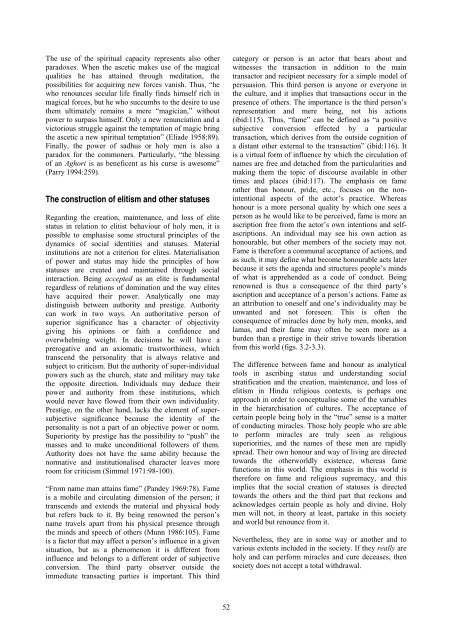
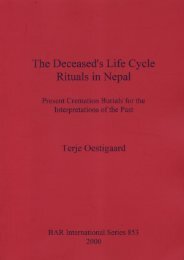


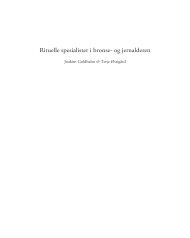
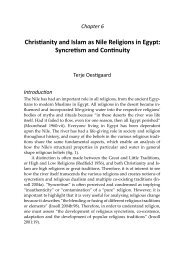
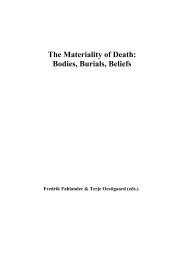


![Fullmono-AK [P2118].indd - oestigaard](https://img.yumpu.com/18994998/1/177x260/fullmono-ak-p2118indd-oestigaard.jpg?quality=85)